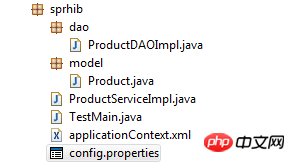
This article mainly introduces you to the relevant information of Spring and Hibernate for learning Java transaction management. The article introduces it in detail through sample code. Friends who need it can refer to it. Let's take a look together.
Environment and version
The related lib of hibernate in an article before this article came out
Java Transaction Management Hibernate
You also need to add the spring lib package and the following dependency packages
org.aopalliance
org.aspectj
org.apache.commons
The version of Spring is Spring 4.1.5.
Dependency packages can also be downloaded from the Spring official website, with names similar to spring-framework-3.0.2.RELEASE-dependencies
Theoretical knowledge
After the integration of Spring and Hibernate, when performing database operations through Hibernate API, I found that opensession, close, beginTransaction, and commit are required every time. These are repetitive tasks, and we can leave the transaction management part to the spring framework.
After using spring to manage transactions, you no longer need to call beginTransaction and commit in dao, nor do you need to call session.close(), use API sessionFactory.getCurrentSession()To replace sessionFactory.openSession()
* If you are using a local transaction (jdbc transaction)
<property name="hibernate.current_session_context_class">thread</property>
* If you are using a global transaction (jta Transaction)
<property name="hibernate.current_session_context_class">jta</property>
Detailed explanation of the transaction attributes of the Propagation class in Spring:
PROPAGATION_REQUIRED: Supports the current transaction. If there is no transaction currently, create a new one affairs. This is the most common choice.
PROPAGATION_SUPPORTS: Supports the current transaction. If there is no transaction currently, it will be executed in a non-transactional manner.
PROPAGATION_MANDATORY: Supports the current transaction. If there is no current transaction, an exception will be thrown.
PROPAGATION_REQUIRES_NEW: Create a new transaction. If a transaction currently exists, suspend the current transaction.
PROPAGATION_NOT_SUPPORTED: Perform operations in a non-transactional manner. If a transaction currently exists, suspend the current transaction.
PROPAGATION_NEVER: Executed in a non-transactional manner, if a transaction currently exists, an exception will be thrown.
PROPAGATION_NESTED: Supports the current transaction. If the current transaction exists, a nested transaction will be executed. If there is no current transaction, a new transaction will be created.
Spring can use xml for configuration or annotation declaration for transaction management.
xml mode configuration transaction code example

<?xml version="1.0" encoding="UTF-8"?>
<beans xmlns="http://www.springframework.org/schema/beans"
xmlns:xsi="http://www.w3.org/2001/XMLSchema-instance" xmlns:p="http://www.springframework.org/schema/p"
xmlns:context="http://www.springframework.org/schema/context"
xmlns:util="http://www.springframework.org/schema/util" xmlns:mvc="http://www.springframework.org/schema/mvc"
xmlns:tx="http://www.springframework.org/schema/tx"
xmlns:aop="http://www.springframework.org/schema/aop"
xsi:schemaLocation="
http://www.springframework.org/schema/util
http://www.springframework.org/schema/util/spring-util-3.1.xsd
http://www.springframework.org/schema/beans
http://www.springframework.org/schema/beans/spring-beans-3.1.xsd
http://www.springframework.org/schema/context
http://www.springframework.org/schema/context/spring-context-3.1.xsd
http://www.springframework.org/schema/mvc
http://www.springframework.org/schema/mvc/spring-mvc-3.1.xsd
http://www.springframework.org/schema/tx
http://www.springframework.org/schema/tx/spring-tx-3.0.xsd
http://www.springframework.org/schema/aop
http://www.springframework.org/schema/aop/spring-aop-3.0.xsd">
<context:component-scan base-package="com.oscar999.trans.sprhib" />
<context:property-placeholder location="classpath:/com/oscar999/trans/sprhib/config.properties" />
<bean id="dataSource" class="org.apache.commons.dbcp.BasicDataSource"
destroy-method="close">
<!-- Connection Info -->
<property name="driverClassName" value="${jdbc.driver}" />
<property name="url" value="${jdbc.url}" />
<property name="username" value="${jdbc.username}" />
<property name="password" value="${jdbc.password}"></property>
</bean>
<bean id="sessionFactory"
class="org.springframework.orm.hibernate4.LocalSessionFactoryBean">
<property name="dataSource" ref="dataSource"></property>
<property name="hibernateProperties">
<props>
<prop key="hibernate.dialect">org.hibernate.dialect.OracleDialect</prop>
<prop key="hibernate.hbm2ddl.auto">update</prop>
<prop key="hibernate.show_sql">true</prop>
<prop key="hibernate.format_sql">true</prop>
<prop key="hibernate.jdbc.batch_size">20</prop>
<prop key="hibernate.enable_lazy_load_no_trans">true</prop>
<prop key="hibernate.current_session_context_class">org.springframework.orm.hibernate4.SpringSessionContext</prop>
<prop key="jdbc.use_streams_for_binary">true</prop>
</props>
</property>
<property name="packagesToScan">
<list>
<value>com.oscar999.trans.sprhib.model</value>
</list>
</property>
</bean>
<!-- Transaction -->
<bean id="transactionManager"
class="org.springframework.orm.hibernate4.HibernateTransactionManager">
<property name="sessionFactory" ref="sessionFactory" />
</bean>
<tx:advice id="txAdvice" transaction-manager="transactionManager">
<tx:attributes>
<tx:method name="save*" propagation="REQUIRED" />
<tx:method name="*" read-only="true" />
</tx:attributes>
</tx:advice>
<aop:config proxy-target-class="true">
<aop:pointcut expression="execution(* com.oscar999.trans.sprhib.dao.ProductDAOImpl.*(..))" id="pointcut" />
<aop:advisor advice-ref="txAdvice" pointcut-ref="pointcut" />
</aop:config>
</beans>jdbc.driver=oracle.jdbc.driver.OracleDriver jdbc.url=jdbc:oracle:thin:@12.6.18.43:1521:orcl jdbc.username= jdbc.password=oracle
/**
* @Title: Product.java
* @Package com.oscar999.trans.hibernate
* @Description:
* @author XM
* @date Feb 15, 2017 1:44:47 PM
* @version V1.0
*/
package com.oscar999.trans.sprhib.model;
import java.io.Serializable;
import javax.persistence.Column;
import javax.persistence.Entity;
import javax.persistence.Id;
import javax.persistence.Table;
/**
* @author XM
*
*/
@Entity
@Table(name = "TEST_PRODUCT")
public class Product implements Serializable {
public Product() {
}
@Id
@Column(name = "ID")
private Integer id;
@Column(name = "NAME")
private String name;
@Column(name = "PRICE")
private String price;
private static final long serialVersionUID = 1L;
public Integer getId() {
return id;
}
public void setId(Integer id) {
this.id = id;
}
public String getName() {
return name;
}
public void setName(String name) {
this.name = name;
}
public String getPrice() {
return price;
}
public void setPrice(String price) {
this.price = price;
}
}/**
* @Title: ProductDAOImpl.java
* @Package com.oscar999.trans.sprhib
* @Description:
* @author XM
* @date Feb 15, 2017 4:15:09 PM
* @version V1.0
*/
package com.oscar999.trans.sprhib.dao;
import org.hibernate.Session;
import org.hibernate.SessionFactory;
import org.springframework.beans.factory.annotation.Autowired;
import org.springframework.stereotype.Repository;
import com.oscar999.trans.sprhib.model.Product;
/**
* @author XM
*
*/
@Repository
public class ProductDAOImpl {
@Autowired
private SessionFactory sessionFactory;
public Product findProductById(int id) {
Session session = sessionFactory.getCurrentSession();
Product product = (Product) session.get(Product.class, id);
return product;
}
public Product saveProduct(Product product) {
Session session = sessionFactory.getCurrentSession();
session.save(product);
return product;
}
}package com.oscar999.trans.sprhib;
import org.springframework.beans.factory.annotation.Autowired;
import org.springframework.stereotype.Service;
import com.oscar999.trans.sprhib.dao.ProductDAOImpl;
import com.oscar999.trans.sprhib.model.Product;
@Service
public class ProductServiceImpl {
@Autowired
private ProductDAOImpl productdao;
public void findProduct(int id) {
Product product = productdao.findProductById(id);
if (product != null) {
System.out.println(product.getName());
}
}
public void saveProduct() {
Product product = new Product();
product.setId(2);
product.setName("product2");
product.setPrice("price2");
productdao.saveProduct(product);
}
}/**
* @Title: TestMain.java
* @Package com.oscar999.trans.sprhib
* @Description:
* @author XM
* @date Feb 15, 2017 3:54:54 PM
* @version V1.0
*/
package com.oscar999.trans.sprhib;
import org.springframework.context.ApplicationContext;
import org.springframework.context.support.ClassPathXmlApplicationContext;
/**
* @author XM
*
*/
public class TestMain {
/**
* @param args
*/
public static void main(String[] args) {
// TODO Auto-generated method stub
ApplicationContext applicationContext = new ClassPathXmlApplicationContext("com/oscar999/trans/sprhib/applicationContext.xml");
ProductServiceImpl productService = applicationContext.getBean(ProductServiceImpl.class);
//productService.findProduct(1);
productService.saveProduct();
}
}The description is as follows:
Declarative mode configuration transaction
Needs to be set in xml configuration
@Service
@Transactional
public class UserServiceImpl implements UserService {
@Autowired
private UserDao userDao;
public User getUserById(int id) {
return userDao.findUserById(id);
}
}@Service
@Transactional
public class UserServiceImpl implements UserService {
@Autowired
private UserDao userDao;
@Transactional(propagation = Propagation.NOT_SUPPORTED)
public User getUserById(int id) {
return userDao.findUserById(id);
}Summarize
The above is the detailed content of Detailed code explanation of Spring and Hibernate for Java transaction management learning. For more information, please follow other related articles on the PHP Chinese website!




